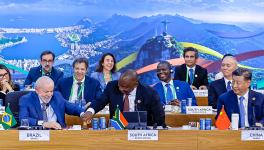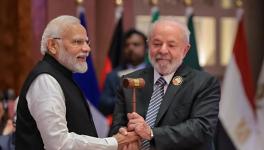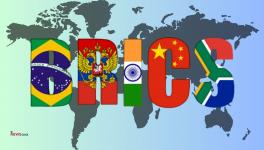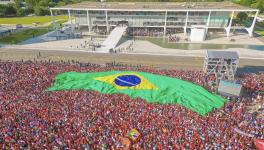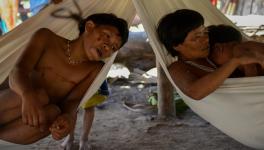The Approaching Coup
In March 2014, a federal judge in Brazil, Sérgio Moro, opened an investigation into the state-controlled oil company, Petrobras, and its relationship with elected officials and contractors. What began as a money-laundering investigation has turned into a sprawling campaign against huge sections of Brazil’s governing establishment.
Operation Lava Jato (“car wash”), as the investigation is known, is now the driving force behind the potential impeachment of President Dilma Rousseff and the political ruin of the Workers’ Party (PT) she leads. While the PT has not shied away from neoliberal reforms, police terror in Rio de Janeiro’s favelas, and massive extractive projects, its fall would open the door to the Brazilian right.

Demonstrators calling for the impeachment of Dilma Rousseff on March 15, 2015. Rubens Passaro / Flickr
Today, Brazil’s lower house will vote on whether to begin impeachment proceedings. Here, Camila Moreno, a well-known left intellectual in Brazil, speaks with Ulrich Brand about the stakes of the scandal, the role of oil in the Brazilian economy, and what an impeachment could mean for the Left.
Scandals over government corruption seem to be driving the political situation in Brazil. What is at stake here?
Right now democracy and the rule of law is at stake. Every day the escalating crisis gains clearer contours and it appears that indeed a coup d’etat is on the way. It is not a classic coup, promoted or supported by the military. Instead, it’s disguised under the banner of the impeachment process.
Although the ability to impeach an elected president is constitutionally provided, it needs to be grounded in, and justified by, some crime. It’s an extreme measure — with far-reaching implications for the social and political order and the democratic process — and so should not be misused.
Fiscal responsibility — not corruption — is currently the main legal argument used by the coalition of forces working to force Dilma Rousseff out of the presidency and the Workers’ Party out of government. The request to begin the impeachment process was accepted based on a petition accusing her of fiscal mismanagement.
This concerns a procedure referred to as “pedalas fiscais” — a procedure introduced in 2000 to regulate government expenditures in all levels of government.
Under the law, government administrations must predict the risk that they’ll go over budget, and have their accounts approved every fiscal year by an auditing authority. The policy was meant to promote transparency and to help to end impunity of bad managing practices in public administration.
But here’s the rub. To meet the new regulations, the Brazilian government (at all levels) borrows its own money (from a public bank or fund) to cover deficitary budget items for that year. Then, when the government money for the next fiscal year is cashed in, the government pays itself back and returns the borrowed money. This can also happen over a larger time span, as is the case now, when the deficit spans two or three years.
It’s a mundane accounting trick but it’s not a minor issue. The law is meant to provide economic stability and to help control inflation. When we consider that Brazil’s current development model is largely based on public expenditure (infrastructure, procurements, etc) and indebtedness, this predicted risk can become an important “instability” index for the economy as a whole.
This practice, and Dilma’s responsibility for what has been done at federal level, is the legal basis for the impeachment request. Whether Dilma’s administration has been “irresponsible” is what is going to be decided at the last stage of the process, in the Supreme Court. The judges will ultimately decide if her administration’s actions constitute a crime and whether she will lose her mandate.
But even if there is not a juridical fact that justifies it, there is a political fact that is pushing the entire process forward.
Parallel to the impeachment is the huge, and unprecedented, Lava Jato anti-corruption investigation, which is exposing the structural connections between economic and political power in the country. The consequences of the investigation are yet unknown.
But many on the Left share the hypothesis that the alliance — now clustered around Vice President Michel Temer — driving Dilma’s impeachment have a vested interest in the direction Lava Jato takes.
Impeaching Dilma can provide a sense of “justice served,” “page turned,” etc, while giving those who come to power in her place influence over the investigations. They can then can water them down and prevent much greater damage to the big tycoons and business interests involved. The media is a key player in selling this narrative: “PT out equals problem solved” — as if it were that simple.
In this context, the impeachment is a type of political subterfuge. It’s a silver bullet for what’s actually a much deeper political crisis. The case is embedded in an increasingly polarized social context shaped by massive media (and social media) campaigns against the PT, and against a background of economic slowdown, inflation, rising unemployment, devaluation of the Real, etc.
Can you talk about the latest developments?
In Brazil things are moving at light speed. The impeachment is practically a fact, I am afraid — unless a real miracle happens by Sunday. Anyways, people are expected to mobilize and demonstrate from Friday to Sunday when the decision session will take place.
After the parliament vote Sunday afternoon, the approved impeachment request will go to the Senate. And, then, once approved by the Senate, likely by end of April, maximum mid-May, President Dilma will have to step out for 180 days until the final decision comes from the Supreme Court.
Once she is out — and given the conspiratorial and political nature of the processes, disregarding the due legal process — she is not likely to come back.
Over the few last days the tension has escalated. Dilma has even made a public speech referring to the vice president and the president of the house of deputies as the author and vice-author of the coup — which is by now 100 percent clear.
Vice President Temer “accidentally” leaked on Monday a voice message via WhatsApp, “rehearsing” his speech as if the impeachment was already decided. In fact it was leaked intentionally, as a message signaling what he is offering for those who will vote for the impeachment and support him.
Since then the vice president’s official house has been the epicenter of a pilgrimage. He is reportedly naming people he wants to appoint as ministers and talking about the need to implement a “shock program” to send a very clear message to the market in his first ten days in power. This includes, of course, a huge reform to the public pension scheme, among other things.
Former president Lula is taking the lead on mobilizing with allies and social movements and promising to stay in the streets and in opposition from now on.
By the way: Temer’s fourteen-minute leaked “draft” speech to the nation does not refer, at any moment, to the word “corruption.”
What is known about who — and how much money — is involved in the corruption? Is there evidence that Rousseff is implicated?
Last year one of the public prosecutors coordinating the investigation reported an estimated R$200 billion per year ($49 billion) of public money was linked to corruption.
Since the joint operation — which involves judges, and the federal police — began in March 2014 it has recovered R$2.9 billion ($825 million). The total amount that federal prosecutors asked corrupt Petrobras executives and construction company operators to give back is currently around R$21.8 billion ($6.2 billion), a value referred to by judges and prosecutors as “the tip of the iceberg.”
It is no exaggeration to say that this investigation has stirred up, by far, the largest institutional crisis in the history of the republic.
While the exposure of this major graft scandal has sparked the criticism that it is a biased and partisan attempt to target mainly the PT and its allies, over the course of the current investigation it has been acknowledged that corruption is a systemic and generalized practice that has been going on since — at least — the Sarney government, the first civil president after the military dictatorship.
Recently, a massive list with a detailed account of payments over many years made by the country’s largest construction company (Oderbrecht) was found and made semi-public by the media before being classified as confidential by the judge.
The list appears to involve, in different degrees, almost everyone in the Brazilian political class; it is far-reaching and reveals that illegal practices are not episodic, but are structural to the dynamics of how politics are run in Brazil, and how political campaigns are financed.
The list reveals corruption to be deeply interwoven with the state’s structure, logic, acting capacity, and motivations.
However, the epicenter of the Lava Jato investigation is mostly restricted to those contracts involving Petrobras, the largest state-owned oil company; its connections with money laundering and its maneuvering to protect the governing alliance.
The investigations have exposed the same dynamic in other energy sectors; in hydroelectricity, involving for instance the controversial Belo Monte mega-dam, and in the construction of nuclear plants.
The criminal scheme consisted of Brazilian construction companies colluding with corrupt authorities in Petrobras (and eventually other state-owned companies) to overcharge in a public procurement contract, and using a percentage of the total contract value for personal gain and to finance political campaigns. This has also exposed the role played by lobbyists and political marketing and advertising firms, with their billionaire accounts in Switzerland and fiscal paradises offshore.
President Dilma is not in the list, neither has her name appeared anywhere so far. Former president Lula’s name is also not on this list. So far, there is absolutely nothing connecting President Rousseff personally with corruption. The investigation’s latest trend is trying to connect illegal money to the marketing firm of her last presidential campaign.
Why was the investigation started and why has it become so prominent at this point in time?
The Lava Jato investigation began in March 2014. It claims to have exposed the largest organized corruption scheme in the recent history of the republic, and puts PT members as central operators and beneficiaries of the scheme.
However, this kind of investigation can only happen because the successive PT governments have worked for and permitted the autonomy that federal policy now enjoys.
The same crimes were perpetated before, but it is only now that they can be investigated and processed before the law. Today’s judiciary independence was made possible, intentionally, under the PT administration.
Another aspect is the salvacionista, messianic character of this generation of federal prosecutors, who see themselves as crusaders against corruption. They are ostensibly not interested in targeting the leadership of only one specific party.
But many critics point out how the investigations sometimes appear to target PT members and PT-related individuals specifically, and pointing out the dramatic and often arbitrary actions of the federal police, prosecutors, and judges who claim to be acting for the investigation.
Its most extreme cases were the release of the intercepted phone calls between Dilma and Lula, as well as many private phone conversations between Lula and his family. One of these episodes which caused an uproar last month was the detention of Lula, meant to coerce his statement to police, which was made into a dramatic show.
A lot of content in the recordings is nasty, and gives you a glimpse of how the people in power talk to each other. Still, it was a violation of privacy, clearly going overboard. The widespread release of the recordings on the same day they were made was meant to feed into the political unrest and to provoke a reaction.
The Supreme Court now says Judge Moro acted with haste, and despite his “good intentions” may have created problems with the validity of these tapings as a legal “proof” in the due process.
What is the role of the PT’s junior government partner, the Brazilian Democratic Movement Party (PMDB)? Who has joined them in their push for the impeachment of Dilma Rousseff?
PMDB has been a key party of the coalition in power with PT since its inception. How we got to this moment would be unbelievable if it were not so scandalous.
On March 29, the PMDB, party of Vice President Michel Temer, held a “flash” meeting to announce, in less than three minutes, that it was stepping out of the government and turning back all its positions.
The PMDB currently holds six key ministries (agriculture, health, science and technology, mining and energy, civil aviation, and ports) and over six hundred positions in the federal administration.
We are still waiting to see how this will unfold, but the government has announced immediately a ministerial reform, and it will distribute ministries (and its budgets) to smaller parties in what looks like a desperate attempt to gather support in congress.
The stepping out of PMDB was the end of a nine-year official alliance with the PT (since 2007 when it officially became part of the sustaining base of the government in both houses). While posing for the picture to the press, deputies and senators were chanting out loud: “Fuera PT!” and “Temer Presidente!” (“PT out!” “Temer for president!”).
PMDB is a key force in the pro-impeachment campaign – as is Eduardo Cunha, the arch-enemy of the government and responsible for accepting and opening the impeachment request.
Cunha, the current president of the deputy chamber in Congress, is himself (along with his family) being investigated and charged for many corruption scandals and money laundering cases, with proven accounts in Switzerland and other offshore fiscal paradises.
However, the impeachment move is carried out by a broader alliance of forces. There’s the PMDB, in agreement with the opposition PSDB, the party of Aécio Neves, José Serra, and Fernando Henrique Cardoso who lost lost the last election to Dilma.
They’re backed by a politicized judiciary, led by Lava Jato’s Sérgio Moro, who’s been elevated to the level of national hero by the media and anti-PT crowd; with Gilmar Mendes, a minister of the Supreme Court who is a loud anti-PT activist.
There are many examples of the judiciary openly taking sides: for instance the judge who suspended Lula’s ministry nomination had posted Facebook pictures of himself attending the anti-Dilma protests and of the “Fuera PT” banners.
There is also the massive pressure by the media conglomerates, especially Globo, who has the largest TV channel in the country. Even the New York Times had an editorial piece, criticizing Dilma’s decision to offer Lula the ministry position.
In 2015, Dilma Rouseff and the PT almost lost the national elections, with only 51.6 percent of the vote in the second round against Aécio Neves. Have they addressed their weaknesses since then?
The election was decided in its second round, in late October 2014. Dilma and the PT did not win by a large majority of votes, but they won by 3.5 million votes. Period. This is how the system works and is part of the limits of the simple majority democracy.
Brazilian society was very polarized already, the tone of the campaign was very aggressive, and all attempts were made by the opposition to use the Lava Jato findings (which started in March 2014) to criminalize Lula and Dilma as part of the Petrobras corruption schemes.
Because of the very tight victory, the opposition started to question the results on the very same day of the election, arguing that there was fraud, etc. The Brazilian Social Democracy Party (PSDB) filed a case in the High Electoral Court, asking for a recount.
We say that since day one after the election the “third round” started. The opposition never accepted that they lost, and the impeachment is part of their refusal to accept this. Now they want to steal back the results of the elections and take her out – they don’t care that she was elected by popular vote.
It became public recently that earlier in 2016, there was a suggestion among Dilma’s advisers that she propose new general elections, so the issue could be held up to popular scrutiny, by vote, to be decided. There was no consensus on the proposal and now the timing is lost.
The opposition’s strategy is to take her out while keeping the vice president and all the Congress and Senate members – many of whom are under current criminal investigation or already charged with corruption.
I personally think that a call to general elections could have been a great opportunity to radicalize democracy, to take the polarized positions to the voting stage; an opportunity to repair their trust with society and make people responsible and part of the process.
The biggest test will be in the municipal elections of this October. One of the underlying logics of the current anti-PT alignment is that old faces and conservative forces of politics want to use the opportunity to be re-branded and seen as part of a “renewal” wave.
They’re selling a general anti-corruption and “PT is the root of all evils” discourse, looking after city-level elections later this year. This election will be quite decisive for shaping up the forces (and basis of support) before the 2018 presidential elections.
If the PT does not reinvent itself radically, it’s hard to evaluate how the situation will unfold. It also depends on the next chapter of the Lava Jato investigation. A lot more rotten stuff can came out, who knows.
A lot of key findings concerning powerful interests can also be buried under the Supreme Court, the last stage where the issues are being decided. There are many factors at play and the scene changes swiftly.
Currently, a lot of the energy that is feeding into the pro-government mobilization comes from the threat of a coup and the sense that things can get much worse.
But also a lot of the people who are mobilizing now, against a coup and in defense of democracy, legality, and the rule of law, are very critical of the current government, of what PT has become, its strategies to maintain its power with spurious alliances and coalitions – for which the price paid is now very clear.
Maybe out of all this crisis there will emerge an opportunity for renewal; with social movements on a different level of dialogue with the government and the PT, with new movements emerging, with existing movements getting stronger. It will also be interesting to see how small leftist parties will position themselves from now on.
How has the crisis affected the economy?
The economy has halted; there is inflation, recession, and growing unemployment. In addition, there were big fiscal cuts in the current budget and new austerity measures, including a rollback of some social programs and workers’ rights. The currency is quite devalued.
For the sake of stability, currently the only sector that is generating income and keeps showing continuous growth is agribusiness: gaining access to new markets for grains and meats, accessing credit, big infrastructure project developments, and building a likely long-term partnership with the Chinese market.
The impact of the petro-dependence development model is clear. The investigation has put on hold all the big Petrobras construction contracts. Infrastructure developments of all sorts are suspended (ports, refineries, etc).
This additionally impacts the naval industry, a key engine for the construction of ships, oil platforms, ducts, pipelines – all dependent on mining and energy. There were many services embedded in these industries (software, engineering, legal services, logistics, etc).
This trickles down the entire economic chain. In some places in Rio de Janeiro’s state there are former oil cities which now look more like ghost towns.
People have been laid off, there are no short-term prospects, some firms are declaring bankruptcy or are under critical intervention, contracts are being broken (and fees need to be paid, there are risk insurances, etc). Lots of public investment (and loans), as well as money from key pension funds in the country were invested in the oil infrastructure.
Of course all this is also due to the low oil prices in the international market, which is affecting many other countries as well. There is the devaluation of our currency.
On the other side of the commodity super-cycle, there is also low demand for iron ore (after soy the second most important commodity export for Brazil). That industry faces low prices and its growth is almost 100 percent dependent on the urbanization process in China and larger Asia on the other side of the planet. Only war prospects can generate a fast increase in iron and steel demand.
How is the current government addressing this? Did Dilma’s trip to the US indicate a shift in her international orientation?
The answer has been unconditional government support to agribusiness and all its demands, as the sector is currently anchoring the economy. Agribusiness representatives refer ever more frequently their sector as the “protein industry,” reaching new technological and productivity breakthroughs in incredible fast rates (and low costs) for transforming soy and maize into chicken.
Other than agribusiness, to keep up with the levels of growth for which the Brazilian development model became famous, there is no plan B other than the big bet on offshore oil. This faith goes against the reality of low international prices for oil and iron ore with no forecast of recovery any time soon, not on the same scale as the last decade.
Meanwhile, the official economic discourse is completely abstract and disconnected from how the economy functions, its dependence on global processes and reproduction of social lifestyles. The government’s discourse keeps using such empty rhetoric as “the need to foster growth,” “develop the economy,” “create jobs and opportunities,” etc.
Of course, oil plays a central role in this imaginary. Many social movements bought the rhetoric of “the oil is ours,” as the solution to all social funding and land reform needs.
The defense of Petrobras is also framed in terms of an anti-imperialist struggle, attributing a plan to privatize it and hand the pre-salt oil reserves to transnational corporations to the opposition.
In my opinion this dichotomy avoids facing the more structural debate about our oil dependency. The dependency helps justify our military expenditures, the building of a nuclear submarine, etc. This was justifiable to “protect” our reserves.
It’s very complicated to have this debate among the left. For example, currently, CNOOC and CNPC (the Chinese state-owned oil companies) are part of the consortium that won the concession to exploit the largest offshore oil field. This was not seen as a problem among the Left.
Dilma’s trip to the US in 2015 was a rapprochement with the US, after the 2013 scandal concerning NSA spying on her phone calls, an episode which led her to cancel her visit to the US at the time.
Last year’s trip was mainly important because it marked the final decision concerning the US lifting its phyto-sanitarian barrier to Brazilian beef imports, which has been an issue for more than fifteen years. This opens a very strategic and important market for Brazil.
You seem to have a rather ambiguous position towards the current political situation in Brazil.
Indeed, this is the case. On the one hand, it is very difficult to defend the government. If the PT stayed in government we all know what they would continue to do. And this is not good. On the other, we must go to the street and defend against a possible coup, even if it is hard.
Many PT members are surprisingly coming out with very strong self critiques in interviews and public speeches. I am not sure if this is sincere or is a script to get support in a desperate moment.
I hope that it can be the seeds of the long, painful, and necessary process we will need from now on to reinvent the Left from scratch. Meanwhile, we will need to gather forces from very deep inside to face and to resist to the dark times ahead.
The new issue of Jacobin is out this month. Buy a copy, or a special discounted subscription today.
Disclaimer: The views expressed here are the author's personal views, and do not necessarily represent the views of Newsclick
Get the latest reports & analysis with people's perspective on Protests, movements & deep analytical videos, discussions of the current affairs in your Telegram app. Subscribe to NewsClick's Telegram channel & get Real-Time updates on stories, as they get published on our website.









